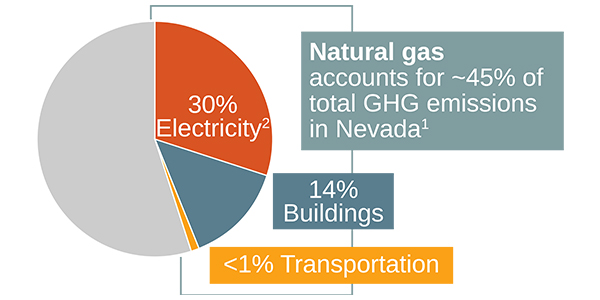Nevada’s natural gas utilities would be required to seek approval every three years for their long-term infrastructure plans, under a bill introduced in the Legislature.
Assembly Bill 380 would require Southwest Gas and NV Energy to file an “infrastructure, supply and alternatives plan” with the Public Utilities Commission of Nevada. The commission would hold a hearing on the plan before deciding whether to approve, modify or reject it.
The plan would contain a cost-benefit analysis of proposed projects and a comparison to alternatives, including doing nothing. The analysis would look at a wide range of factors, including the social cost of greenhouse gas emissions resulting from new infrastructure and impacts to indoor air quality.
AB380 was introduced last week by Assemblywoman Lesley Cohen (D). The bill, which was drafted by the Natural Resources Defense Council, was referred to the Assembly Committee on Growth and Infrastructure. A hearing date had not yet been set.
Proponents of AB380 said it would bring greater accountability to the gas utilities.
“This bill would scrutinize gas utility investments to make sure we are not making investments we will soon regret,” the Nevada Collaborative Conservation Network, a coalition of conservation groups, said in an overview of its 2021 legislative priorities. “This bill will protect gas ratepayers and ensure that any investments made are in line with the state’s climate goals.”
Southwest Gas, the state’s largest provider, opposes the bill.
“AB380 effectively bans natural gas, places unnecessary financial burdens on Nevada families and businesses and aims to eliminate thousands of jobs,” the company said in a statement provided to NetZero Insider.
While Southwest Gas said it’s committed to helping the state meet its emissions targets, “we are confident policymakers will agree there is more than one path to achieving these goals,” the company said.
AB380 would create a planning process for the gas utilities that would be similar to that of NV Energy’s electric utility.
NV Energy must file an integrated resource plan every three years with PUCN. The IRP looks at different ways to meet forecasted demand, including conservation and renewable energy resources. The commission decides whether facilities proposed in the plan would be prudent investments.
In contrast, the gas companies currently submit annual informational reports to PUCN that do not go through a hearing process.
Multipronged Bill
The infrastructure, supply and alternatives plan that would be required is just one piece of AB380.
The bill would set targets for the state to reduce net greenhouse gas emissions from combustible fuels used in commercial and residential buildings. The targets would start with a 2.5% reduction in 2022 as compared with 2016 levels and increase every other year until reaching 95% in 2050.
The gas utilities would be required to explain in their long-range plans how those decarbonization goals could be met.
A third part of AB380 would require that PUCN open a docket to investigate issues related to natural gas. Those would include the number and types of customers who have limited options for energy supply, as well as ways to limit the impact to low-income residents of switching buildings from natural gas to electric power.
Transition from Gas
The introduction of AB380 last week coincided with the release of a natural gas “fact sheet” by the Nevada Climate Initiative, created last year by Gov. Steve Sisolak.
The fact sheet underscores some of the conclusions reached in the State Climate Strategy that NCI rolled out in December.
“In order to meet Nevada’s long-term goal of zero or near-zero greenhouse gas emissions by 2050, transitioning away from natural gas is necessary,” the strategy said. And that includes moving away from natural gas appliances for cooking, water heating and space heating in homes and businesses.
However, equity issues must be considered in making such a switch, the strategy said. For example, people living in rural areas may have limited access to the electric grid, and commercial kitchens might need natural gas.
Some cities in California have banned natural gas in new homes, but Nevada isn’t eyeing a similar move at this time, NRDC senior scientist Dylan Sullivan told NetZero Insider.
Instead, Sullivan said, the focus is on aligning the utility planning process with state climate goals.
“That means gas utilities would need to show that their infrastructure spending plans will keep energy affordable and safe as Nevadans move toward powering their homes and businesses with clean electricity rather than fossil fuels,” he said.




